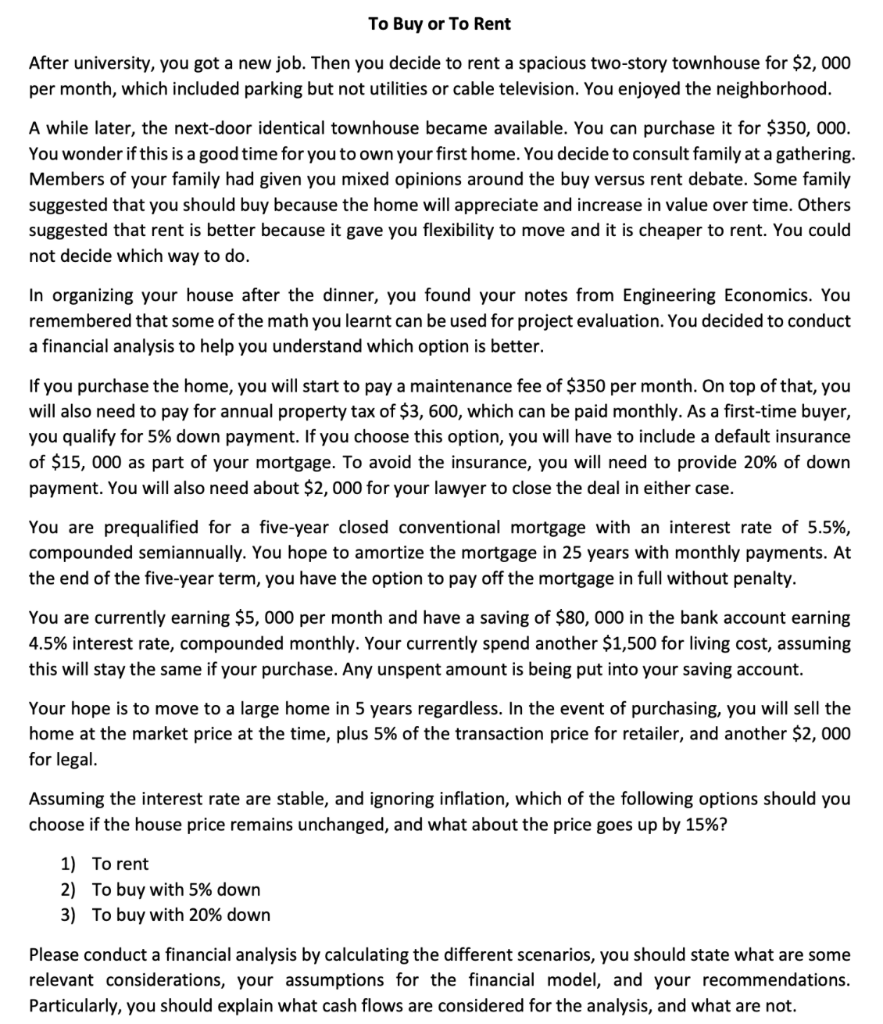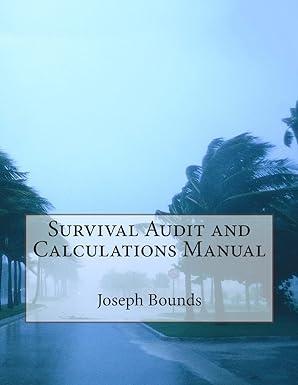Answered step by step
Verified Expert Solution
Question
1 Approved Answer
The math portion with explanation please To Buy or To Rent After university, you got a new job. Then you decide to rent a spacious

The math portion with explanation please
To Buy or To Rent After university, you got a new job. Then you decide to rent a spacious two-story townhouse for $2,000 per month, which included parking but not utilities or cable television. You enjoyed the neighborhood. A while later, the next-door identical townhouse became available. You can purchase it for $350,000. You wonder if this is a good time for you to own your first home. You decide to consult family at a gathering. Members of your family had given you mixed opinions around the buy versus rent debate. Some family suggested that you should buy because the home will appreciate and increase in value over time. Others suggested that rent is better because it gave you flexibility to move and it is cheaper to rent. You could not decide which way to do. In organizing your house after the dinner, you found your notes from Engineering Economics. You remembered that some of the math you learnt can be used for project evaluation. You decided to conduct a financial analysis to help you understand which option is better. If you purchase the home, you will start to pay a maintenance fee of $350 per month. On top of that, you will also need to pay for annual property tax of $3,600, which can be paid monthly. As a first-time buyer, you qualify for 5% down payment. If you choose this option, you will have to include a default insurance of $15,000 as part of your mortgage. To avoid the insurance, you will need to provide 20% of down payment. You will also need about $2,000 for your lawyer to close the deal in either case. You are prequalified for a five-year closed conventional mortgage with an interest rate of 5.5%, compounded semiannually. You hope to amortize the mortgage in 25 years with monthly payments. At the end of the five-year term, you have the option to pay off the mortgage in full without penalty. You are currently earning $5,000 per month and have a saving of $80,000 in the bank account earning 4.5% interest rate, compounded monthly. Your currently spend another $1,500 for living cost, assuming this will stay the same if your purchase. Any unspent amount is being put into your saving account. Your hope is to move to a large home in 5 years regardless. In the event of purchasing, you will sell the home at the market price at the time, plus 5% of the transaction price for retailer, and another $2,000 for legal. Assuming the interest rate are stable, and ignoring inflation, which of the following options should you choose if the house price remains unchanged, and what about the price goes up by 15% ? 1) To rent 2) To buy with 5% down 3) To buy with 20% down Please conduct a financial analysis by calculating the different scenarios, you should state what are some relevant considerations, your assumptions for the financial model, and your recommendations. Particularly, you should explain what cash flows are considered for the analysis, and what are not. To Buy or To Rent After university, you got a new job. Then you decide to rent a spacious two-story townhouse for $2,000 per month, which included parking but not utilities or cable television. You enjoyed the neighborhood. A while later, the next-door identical townhouse became available. You can purchase it for $350,000. You wonder if this is a good time for you to own your first home. You decide to consult family at a gathering. Members of your family had given you mixed opinions around the buy versus rent debate. Some family suggested that you should buy because the home will appreciate and increase in value over time. Others suggested that rent is better because it gave you flexibility to move and it is cheaper to rent. You could not decide which way to do. In organizing your house after the dinner, you found your notes from Engineering Economics. You remembered that some of the math you learnt can be used for project evaluation. You decided to conduct a financial analysis to help you understand which option is better. If you purchase the home, you will start to pay a maintenance fee of $350 per month. On top of that, you will also need to pay for annual property tax of $3,600, which can be paid monthly. As a first-time buyer, you qualify for 5% down payment. If you choose this option, you will have to include a default insurance of $15,000 as part of your mortgage. To avoid the insurance, you will need to provide 20% of down payment. You will also need about $2,000 for your lawyer to close the deal in either case. You are prequalified for a five-year closed conventional mortgage with an interest rate of 5.5%, compounded semiannually. You hope to amortize the mortgage in 25 years with monthly payments. At the end of the five-year term, you have the option to pay off the mortgage in full without penalty. You are currently earning $5,000 per month and have a saving of $80,000 in the bank account earning 4.5% interest rate, compounded monthly. Your currently spend another $1,500 for living cost, assuming this will stay the same if your purchase. Any unspent amount is being put into your saving account. Your hope is to move to a large home in 5 years regardless. In the event of purchasing, you will sell the home at the market price at the time, plus 5% of the transaction price for retailer, and another $2,000 for legal. Assuming the interest rate are stable, and ignoring inflation, which of the following options should you choose if the house price remains unchanged, and what about the price goes up by 15% ? 1) To rent 2) To buy with 5% down 3) To buy with 20% down Please conduct a financial analysis by calculating the different scenarios, you should state what are some relevant considerations, your assumptions for the financial model, and your recommendations. Particularly, you should explain what cash flows are considered for the analysis, and what are notStep by Step Solution
There are 3 Steps involved in it
Step: 1

Get Instant Access to Expert-Tailored Solutions
See step-by-step solutions with expert insights and AI powered tools for academic success
Step: 2

Step: 3

Ace Your Homework with AI
Get the answers you need in no time with our AI-driven, step-by-step assistance
Get Started


